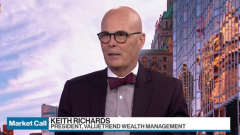Apr 5, 2024
Iran Reprisal Fears, Kashkari Warning Spark Selloff in EM Assets
, Bloomberg News

(Bloomberg) -- Emerging-market assets declined after strong US payroll data on Friday forced traders to reprice odds the Federal Reserve will cut interest rates in the first half of the year.
US nonfarm payrolls climbed 303,000 last month, the strongest in nearly a year, prompting a shift in Fed swaps and a rise in 10-year Treasury yields. The blowout report sapped demand for risky assets — indexes for emerging stocks and currencies closed lower.
This “shifts rate cut expectations further out the curve which will keep the USD strong,” said Brad Bechtel, global head of FX at Jefferies Financial Group Inc.
Read more: Blowout Jobs Data Raise Chance of Delayed, Fewer Fed Rate Cuts
Officials added to the view that US rates may remain higher for longer. On Friday, Federal Reserve Bank of Dallas President Lorie Logan signaled its “much too soon” to think about rate cuts, citing upside inflation risk and the resilience of the US economy, while Fed Governor Michelle Bowman reiterated that it’s too soon to consider lowering borrowing costs.
The Chilean peso and the South Korean won led currencies lower. On other end, the Mexican peso defied the broader slump, posting the best gains among major currencies on Friday and extended its lead as the best performer in the world.
“A better-than-expected performance of the US economy is good for the MXN,” said Luis Hurtado, a currency strategist at CIBC in Toronto. But an erosion of the currency’s carry appeal as Mexico lowers rate, combined with “stretched” positioning may keep speculators at bay, he added.
Read More: Mexican Peso’s World-Beating Rally Can’t Shake Off Its Doubters
MSCI Inc.’s benchmark for EM equities fell 0.3% on a closing basis, paring this week’s gains to around 0.2%. The index was dragged down by health care stocks, as WuXi Biologics and other China biotech companies fell in Hong Kong amid concerns that the impact of the US’s Biosecure Act could become more widespread.
Middle East Tensions
Mounting tensions in the Middle East further added to the risk-off sentiment. Iran said it asked the US to “step aside” as the country prepares a response to a suspected Israeli attack on its consulate in Syria while Hezbollah, its main proxy in the Middle East, warned the Jewish state it’s prepared for war.
Read More: The Israel-Iran Shadow War Reaches a Risky New Phase: QuickTake
“The market now knows that some kind of retaliation from Iran will likely come but it doesn’t know when and where and what,” said Bjarne Schieldrop, an analyst at SEB Research. “That creates a great discomfort and nervousness.”
--With assistance from Leda Alvim.
©2024 Bloomberg L.P.






